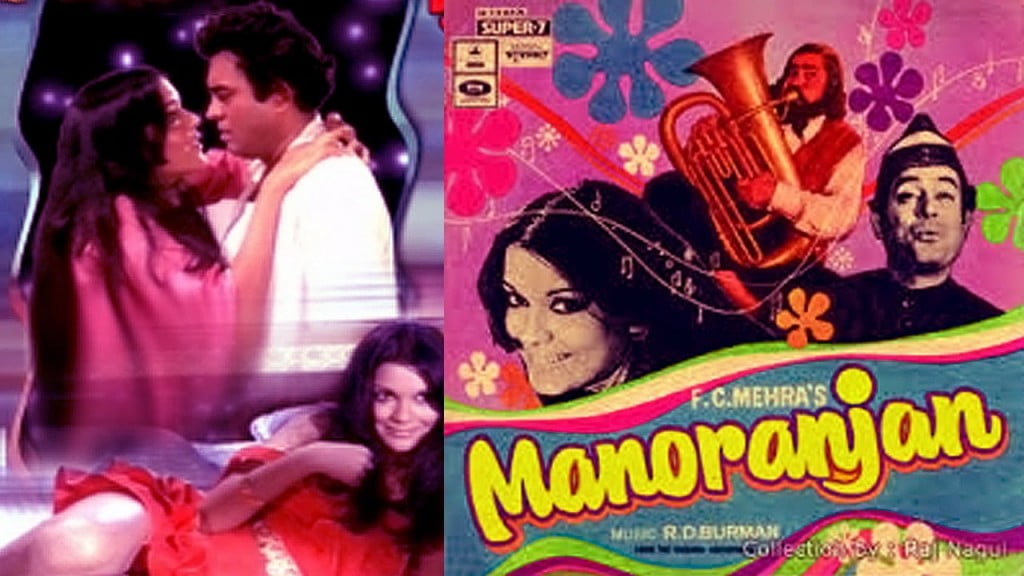Manoranjan, directed by Shammi Kapoor with a star cast of Sanjeev Kumar and Zeenat Aman, is funny, charming, and sweet – not to mention bold and convention-smashing film. The film, released in 1974, is based on the Billy Wilder film Irma La Douce.
Halavaldar Ratan (Kumar) is assigned the duty to foot patrol on Manoranjan Street, a red-light area, where he meets Nisha (Aman), a sex worker. He witnesses many sex workers soliciting customers publicly and as a result he arranges a raid on the hotel. However, one of his senior officer turns out to be a regular visitor of Manoranjan Street who fires Ratan. Ratan, now jobless, eventually ends up at Manoranjan Street, where Nisha offers him to move in with her. Ratan does not want Nisha to continue sex work and to free her from her profession, Ratan adopts the look of a Nawab, who pays her enough weekly so that she no longer needs to offer her services to other men.
The depiction of women characters as emotional, irrational, weak and dependent on men, was sharply rejected by Zeenat Aman’s portrayal of Nisha.
In one of the scenes Ratan, overcome by the need of being the ‘good-guy’, tries to ‘save’ Nisha from her life as a sex worker, and offers to marry her and asks her to leave Manoranjan Street so that he can support her and she no longer needs to have sex for money.
One of the most striking feature of this film is when Nisha quite sharply rebuffs Ranjan’s proposal and says that there is no honour in being supported by a man and her pride requires her to continue her work and provide Ranjan with a comfortable life. She goes on to say that a woman who cannot support a man is of no good, thus a satire on the prevalent social norms that hangs masculine self-worth on the narrow ability to financially support a family.
Manoranjan marked a departure from the popular cinematic depiction of sex work as something which was ‘forced upon’ women. It was perhaps the first Bollywood film where sex work was presented as an ‘enjoyable’ activity without moralising it. In the film, the lead character choses sex work on her own will. The depiction of women characters as emotional, irrational, weak and dependent on men, was sharply rejected by Zeenat Aman’s portrayal of Nisha. While Nisha lives a life generally assigned to vamps and negative characters in Indian cinema, she emerges as a sympathetic, happy, and bold character.
The Manoranjan Street is a world of cheerful sex workers and relatively gentle pimps who behave more like a group of harmless adolescent layabouts; Balram is a brute but he also loves Nisha, and the other pimps, are chummy and comical.
The male lead, Ratan, is anything but a typical ‘Bollywood hero’. The film released at a time when a trend started with the role of Amitabh Bachchan in the film Zanzeer (1973). The hero was always depicted as an angry, disenchanted, lonely person, disinterested in women and romance, yet motivated enough to take on the corrupt world of injustice single-handedly, while delineated as the ‘protector’ of women.
On the other hand, the character Kumar plays, Ratan, is hopelessly naïve and splendidly good-hearted. Ratan, despite his reservations about Nisha’s work and his quest to ‘save’ her from it, does not show any over-the-top toxic masculine characteristics (as it is persistent in most of the Bollywood films even today).
The movie breaks many stereotypes and shows everything about sex work in a very light and stylish way: no hyper masculine hero, no shabby brothels, and no moral policing.
The film clearly connotes that Nisha is the ‘aggressor’ or has a dominant role throughout her relationship with Ratan. Even though, at one particular moment, Ratan tries to take on an aggressive role, he fails to do so. However, this is shown in a comical sense, and in no way is expressed as a failure of Ratan’s ‘masculinity’. Manoranjan, in its own quirky way, smashes the gender roles.
The movie breaks many stereotypes and shows everything about sex work in a very light and stylish way: no hyper masculine hero, no shabby brothels, and no moral policing. Manoranjan is an entertaining comedy with no overtly sexist or demeaning jokes about sex workers and sexuality.
There are a few instances in the movie which depict a sexist outlook. Ranjan’s never ending attempts to take Nisha out of the Manoranjan Street, even after she refused his proposal, his reservations about sex work and his constant remarks about Nisha’s profession are all examples of how Ranjan was trying to demean sex work, and relegating sex workers to an abject, outside category.
However, all in all, Manoranjan is an unconventional movie, which challenged the projection of sex work in popular culture as ‘degrading’ and ‘vulgar’. It is a funny musical with good performances. Both Zeenat Aman and Sanjeev Kumar delivered exceptional performances as Nisha and Ratan respectively. The relationship between them is developed very beautifully, in absence of any typical Bollywood romance ingredients.
While Manoranjan was not a box office success when it was released, primarily due to its bold and unconventional theme, over the years it has acquired the status of a classic. Anyone who loves watching old Bollywood films should definitely watch Manoranjan for the amazing performances, great direction and the strikingly courageous attempt to break stereotypes.
Also read: Mandi Film Review: A Marketplace Of Empowerment
Featured Image Source: The Latest Movie Trailers
About the author(s)
Prerna is a history undergrad student who spends most of her time reading, dancing and arguing why everyone should be a feminist.




